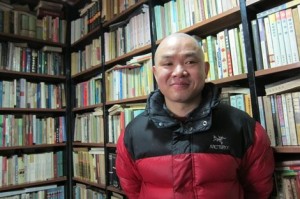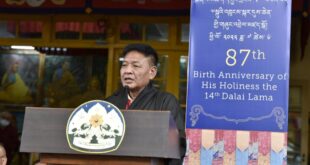By Thubten Samphel* | tibet.net
September 4, 2012
Ancient China erected the Great Wall to keep out the barbarians. Modern China has erected the Great Firewall to prevent barbarian thoughts from infecting the health of the citizens of the People’s Republic. Like the ancient wall, the Great Firewall has been breached. Tibetan exiles have initiated a conversation with the netizens of China that has the potential to moderate Beijing’s policy towards Tibetans and other minorities.
One burning topic of discussion between Tibetan exiles and the Chinese on the Mainland is the spate of fiery deaths that engulf Tibet today. So far, 51 Tibetans have set themselves on fire since 2009. All of them called for freedom in Tibet and the return of His Holiness the Dalai Lama to his homeland. When informed of these self-immolations, the reaction from the Chinese netizens is one of is shock and disbelief. Even when images of self-immolations were sent to them, the sentiment of the majority Chinese netizens is, this can’t be happening in China.
Buried in the widespread sentiment of disbelief are also expressions of support and understanding, says Tsering Wangmo, who heads Drelwa, a Tibetan NGO based in Dharamsala, the seat of His Holiness the Dalai Lama in north India. Drelwa consist of six young Chinese-speaking Tibetans who daily surmount the Great Firewall of China to carry on a conversation with netizens in China. One netizen writes, “You Tibetans are not alone. We are also frustrated by rising food and rent prices. Though we haven’t heard about the self-immolations, we understand the reasons for the frustration arising out of a loss of hope.”
Another blames the Chinese Communist Party for the increasing cases of Tibetans resorting to self-immolation. He says, “The CCP hides the truth and spreads distorted information. The CCP suppresses not only Tibetans, Mongols, Uighurs but the Chinese people. The Chinese people don’t know the truth because all channels of free information are blocked. To solve all these problems, China must tread on the path of democracy.”
These are some of the sentiments of support and sympathy whispered beyond the radar of China’s censor and below the din of China’s Internet chatter.
Others openly express what they feel about the self-immolations going on in Tibet. For example, in an interview for the Foreign Policy magazine in its September-October 2012 issue, Ai Weiwei, the world famous Chinese artist, made these comments. “The one exception is Tibet, because of its natural resources, but the Tibetan people are burning themselves to death. Already over 40 of them in the past two years, and nobody’s talking about it.”
When asked whether he had been to been to Lhasa before, Ai Weiwei said, “No. I would feel ashamed to go. I think to respect [the Tibetans] is not to touch them, to leave them alone.”

Ran Yunfei, one of China’s most outspoken public intellectuals, in an interview to Ian Johnson for the New York Review of Books, said, “The communists really destroyed religion. They don’t understand it at all. Look at Tibet. I told the guobao (state security agents) that, “you guys have gone too far. You don’t allow them to hang pictures of the Dalai Lama. You don’t have faith so you don’t understand. So the Tibetans get very angry and depressed. And then you go into temples and instead hang pictures of Mao and Jiang (Zemin) or Hu (Jintao). You’ve gone overboard! This isn’t right. Think about it. No wonder they set themselves on fire.”
In the wake of the widespread and sustained protests that erupted in Tibet in 2009, Chinese intellectuals’ expression of sympathy for Tibetan grievances was loud and clear. A letter, signed by the leading lights of China, including by the imprisoned Nobel Laureate, Liu Xiaobo and more than 340 others, urged the Chinese authorities to hold direct dialogue with His Holiness the Dalai Lama to resolve the issue. Similarly, in May 2009, Gongmeng, a law firm in Beijing that advocates the rule of law, published a detailed report investigating the causes of Tibetan discontent. It cited China’s policy failure as a major cause. The reported recommended that Beijing in future base its Tibet policy on the aspirations of the Tibetan people.
His Holiness the Dalai Lama joined in this conversation in 2010, answering questions on his successor, his approach to resolve the issue of Tibet with Beijing, the nature of autonomy for Tibet, whether Tibetans would stick to non-violence after his demise and relations between Tibetans and Chinese. 1,543 Chinese submitted 326 questions. 12,771 netizens voted for the final ten questions, which were then answered by the Tibetan leader.
Yu Jie, now in exile in the United States, the author of Wen Jiabao: China’s Best Actor and a biography of Liu Xiaobo, commenting on the event said, “The scale of the dialogue is not that big, just several thousand [participants]. However, I believe its influence and impact are getting bigger and bigger. One day it will defeat all distorted propaganda on the Dalai Lama and truth in Tibet.”
Given China’s current fluid political situation in which the premier of the nation is calling for the absolute necessity for political reform, these voices of moderation and tolerance may shape China’s attitude towards Tibet. Li Yuanchao, head of the Organization Department that supervises appointments of officials and a strong candidate for the Standing Committee of the Politburo, recommends that the authorities “comply with the will of the people.” If these sentiments of Chinese leaders are translated into policy, there is real hope for China and its minorities.
For another group of Chinese there is a different Tibetan attraction. This is Tibetan Buddhism. Young and well-to-do Chinese are turning to Tibetan Buddhism, inviting Tibetan lamas to their homes, joining monasteries in Tibet and even coming to India to attend the teachings of His Holiness the Dalai Lama. This year in January when the Dalai Lama gave a set of Buddhist teachings in Bodh Gaya in northern India where the Buddha attained enlightenment, more than 1,000 Chinese from the Mainland attended the event.
These two strands of conversation which the Tibetans carry on with the Chinese in the Mainland constitute a drop in an ocean. However, if it is allowed to grow to its full potential within an evolving and increasingly pluralistic China, this conversation will help positively shape how China treats its minorities.
*Thubten Samphel is the director of the Tibet Policy Institute. Views expressed here do not reflect those of the Central Tibetan Administration.

